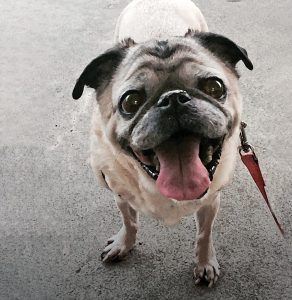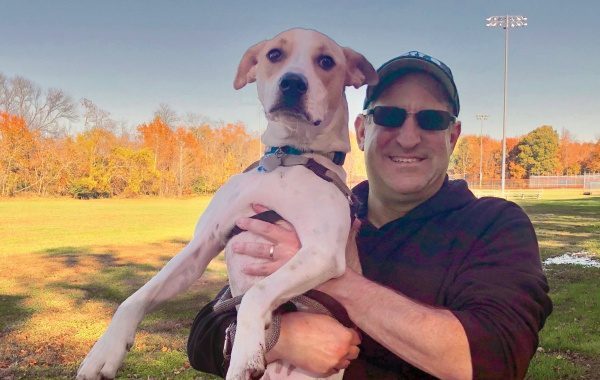
Rufus
Rufus the pug was an old dog who’d lived a good life when he passed away two years ago at the ripe old age of 16, but those details didn’t make it any easier for David Jastrow and his wife Audrey to share the sad news with their daughters. The couple decided to pick up their children early from school to tell them.
“We thought this would soften the blow,” says Jastrow, of Cherry Hill. “We didn’t just want them to come home, and we’d say ‘Hey, how was your day?’ And then: ‘This happened.’ We wanted to get in front of it.”
The family reminisced and cried together.
“We talked about what the grieving process is like and that Rufus is not forgotten,” says Jastrow, 44.
Within days, the family donated Rufus’s dog food, bowls and blankets to the Voorhees Animal Orphanage, “so it could be used by other animals, not go to waste and not be sitting around and reminding us of the loss,” Jastrow says. They planted a Japanese maple tree in their front yard in the beloved pet’s memory and began making occasional donations to the orphanage.
Two months later, when the Jastrows felt ready for a new pet, they adopted Hoagie, a puppy, from the Voorhees Animal Orphanage.
“It’s hard to imagine that you’ll have that kind of attachment to another animal, but we do,” Jastrow says. “It’s sad that Rufus is gone, but he had a lot of health problems toward the end of his life, and it’s good that he isn’t in pain anymore.”
When parents welcome a dog, cat or other animal into their home, they know they’ll outlive the pet. Children, however, may not be prepared for such a loss. Many times, a pet’s passing is a child’s first experience with death, so the conversations and emotions surrounding the event help to shape their thoughts about dying and grief.
Some parents struggle with what to say to their children when the family pet dies. These ideas may help:
Choose the right words
Be honest. Tell your child that your pet has died and won’t be a part of your everyday life anymore, although you’ll always have special memories of times spent together.
“Parents can say, ‘the pain you’re feeling in your heart is so normal,’” says Deborah Silverstein Dombrowski, DVM, professor of emergency and critical care at the University of Pennsylvania School of Veterinary Medicine. “I stress, ‘remember the good times, when they were playing and feeling well and eating.’ Try not to focus on the last stage. The happy times are what you want to remember.”

Jessica and Faith Jastrow with Rufus
Don’t lie to cover up the death or use words that children may interpret as scary, she says.
“Things we encourage people not to say to children include, ‘The animal was put to sleep,’” says Silverstein Dom-browski, a Cherry Hill resident. “Children may take this literally and think they can go to sleep and not wake up.”
Parents may wonder if they should keep their emotions in check while dealing with distraught children. She says adults can and should share their sorrow, she adds.
“If a child is feeling the same things you’re feeling, it’s very normal for them to see their parents sad,” Silverstein Dombrowski notes. “It also shows them that it’s ok to cry.”
Also, it’s a good idea to keep talking about the loss, checking in periodically to see how your child is doing, she adds.
“Bottling up your feelings isn’t healthy,” Silverstein Dombrowski says. “It’s going to be something that keeps resurfacing. You have to talk about it and accept it and deal with it – cry together and do things to bring back some of the positive, happy memories.”
Some children ask if their pets will go to heaven or an afterlife destination like the rainbow bridge popularized in poetry.
“Children take that quite well, knowing this part of their family that they loved very much is somewhere having fun,” Silverstein Dombrowski says. “But it’s perfectly ok to say, ‘I’m not sure what happens after Fluffy’s gone. It’s one of those mysteries in life that we never get to learn about.’”
Seek support
Everyone grieves death differently and this is also true for the loss of a pet. If you and your child need extra comfort, look to each other for support, or reach out to compassionate friends who also remember your loved animal fondly.
“The loss of a dear furry friend is as strong in every sense as the loss of a person – there’s no difference in the steps that you go through,” says Scott Borsky, who runs the Cherry Hill-based nonprofit Animal Rescue Center. “Accept that what you’re feeling is normal. Allow yourself to grieve. Reach out for help and comfort.”
Let adults in your child’s life know about the loss, like a teacher, guidance counselor, coach or dance instructor. Your child may start to act differently, so they will appreciate the explanation.
“Say, ‘please excuse my child if he is not the same for the next few days,’” Borsky says. “‘He’s going through a lot, and his emotions will not be the same.’ This really helps the relationship with the teacher and the child.”
Borsky, who runs a local pet bereavement support group, says being around others who are also grieving a pet may help. “Sometimes other members of the family are not mourning like you think they should,” he adds. “Some of them are just looking for a relief. They need to get some things off their chest, out of their hearts. They just need to talk and cry and hug and share with others.”
Commemorate your pet
Some people plant trees or display an urn on the mantle alongside a pet’s photo. Others grow flowers in the pet’s water bowl or sprinkle the animal’s ashes in a favorite park.
“Sometimes people will ask for a tuft of fur to create some kind of memory area at home,” Silverstein Dombrowski says. “Sometimes a favorite toy or memento can be helpful for a child, to think they still have a piece of them in their heart.”
Letting your child decide how to meaningfully remember your pet can help him find closure, whether that means deciding what to say at a memorial service, writing a farewell letter or designing a commemorative spot in the backyard.
“Let them help with the planning of the rituals to say goodbye,” Borsky says. “That really helps with the mourning process. Never should the parents say, ‘Don’t worry about it. We’re taking care of it.’ Let the children be part of it.”
Don’t get a new pet…just yet
Some people think a new pet will heal a loss, but you and your child need time to grieve before opening your hearts to a different animal.
“Make sure you’re ready to expand your family, not trying to fill that hole in your family,” Silverstein Dombrowski says. “Some kids respond poorly to getting a pet too soon. They can get resentful of a new animal – their heart is not quite ready for it.”
You’ll likely know when you and your child are ready for a new pet, but outward signs include “feeling like you’re happy and not crying every day,” Silverstein Dombrowski says. “You want another family member, but not because you’re trying to replace the one that used to be with you.”














